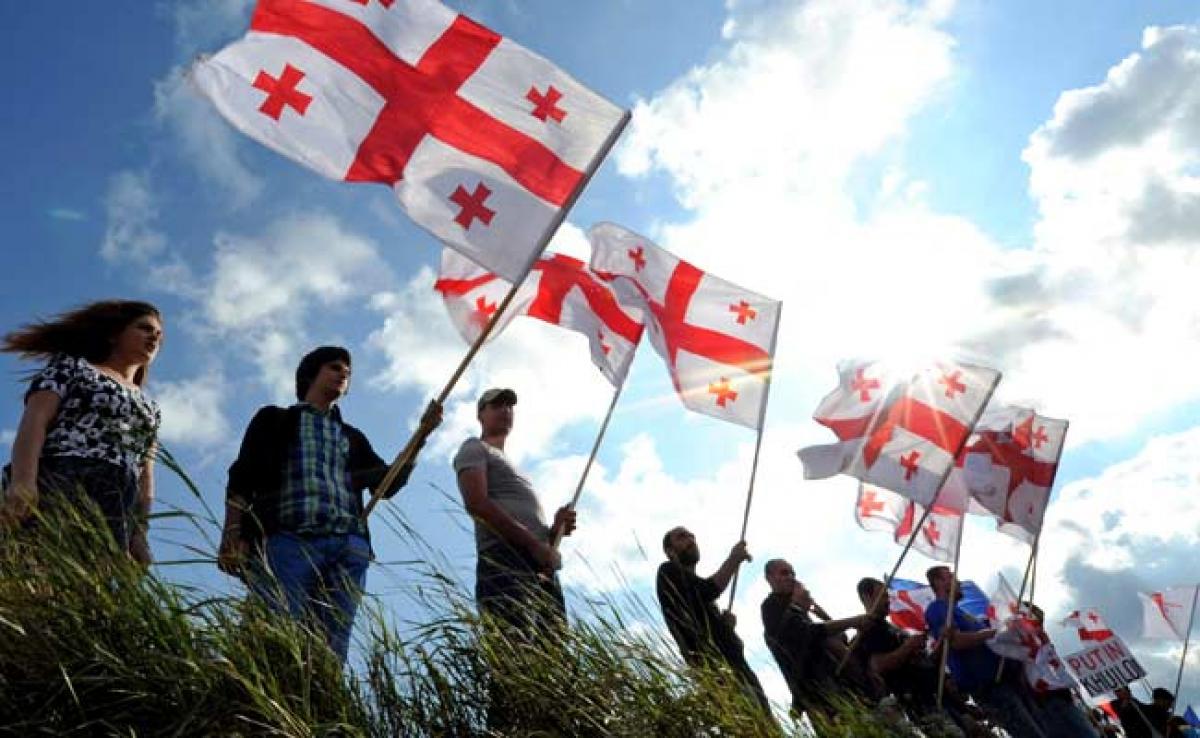Live
- Welfare hostels shut as bills pile up
- CM Revanth Reddy Slams BJP Leaders Over Inaction
- Minister Ponguleti visits Basara temple
- Ashutosh Gowariker to lead International Jury at IFFI 2024
- The global challenges of greener aviation
- Shreyas Media secures exclusive advertising rights for ‘MahaKumbh Mela 2025’
- Experience the journey of art
- Seven iconic ghats undergo makeover for Mahakumbh
- Smog engulfs capital with ‘severe’ air quality
- Slur against HDK wrong, Zameer will be corrected: K’taka Cong
Just In

x
Highlights
Over 3,000 people took to the streets in Georgia on Saturday to protest what they called Moscow\'s occupation of the breakaway South Ossetia and Abkhazia regions.
Over 3,000 people took to the streets in Georgia on Saturday to protest what they called Moscow's occupation of the breakaway South Ossetia and Abkhazia regions.
.jpg)
Carrying placards that read "Stop Russia!" and chanting "Georgia" protesters gathered outside the State Chancellery building in the capital Tbilisi.
"The Kremlin continues to use both hard and soft power in its efforts to subjugate Georgia," one of the protest's organisers, Tamara Chergoleishvili, told AFP.
"We gathered here to show that Russia's aggressive policy doesn't belong to the 21st century," she added.
"(Russian President Vladimir) Putin must know that we will never accept Russian occupation," protester Elene Gerliani, 21, said. "Today's rally is part of our fight for freedom."
On Tuesday, Georgia's Foreign Ministry accused Russia of moving border markers further into Tbilisi-controlled area near the Kremlin-backed separatist region of South Ossetia.
The shift left a portion of the Baku-Supsa pipeline, which transports Caspian oil destined for Western markets, under effective Russian control.
The European Union foreign policy chief, Federica Mogherini, said through a spokesperson that the move "had led to tension in the area."
"Steps that could be perceived as provocative must be avoided," she said.
Russian troops have been installing barbed wire around South Ossetia since Tbilisi's defeat in the brief 2008 Russia-Georgia war over control of the Moscow-backed separatist region.
After the war, Moscow recognised South Ossetia -- along with the separatist enclave of Abkhazia -- as independent states and stationed thousands of troops in the regions that make up some 20 percent of Georgian territory.
The breakaway regions, whose self-proclaimed independence has been recognised by only a handful of countries, are heavily dependent on Russian military and financial support.
The Baku-Supsa pipeline, also known as the Western Route Export Pipeline, runs from Azerbaijan to Georgia's Black Sea terminal of Supsa and can transport up to 100,000 barrels of oil a day.
Last year, some 31 million barrels of crude were pumped through the 830-kilometre pipeline.

Next Story
More Stories
ADVERTISEMENT
© 2024 Hyderabad Media House Limited/The Hans India. All rights reserved. Powered by hocalwire.com







